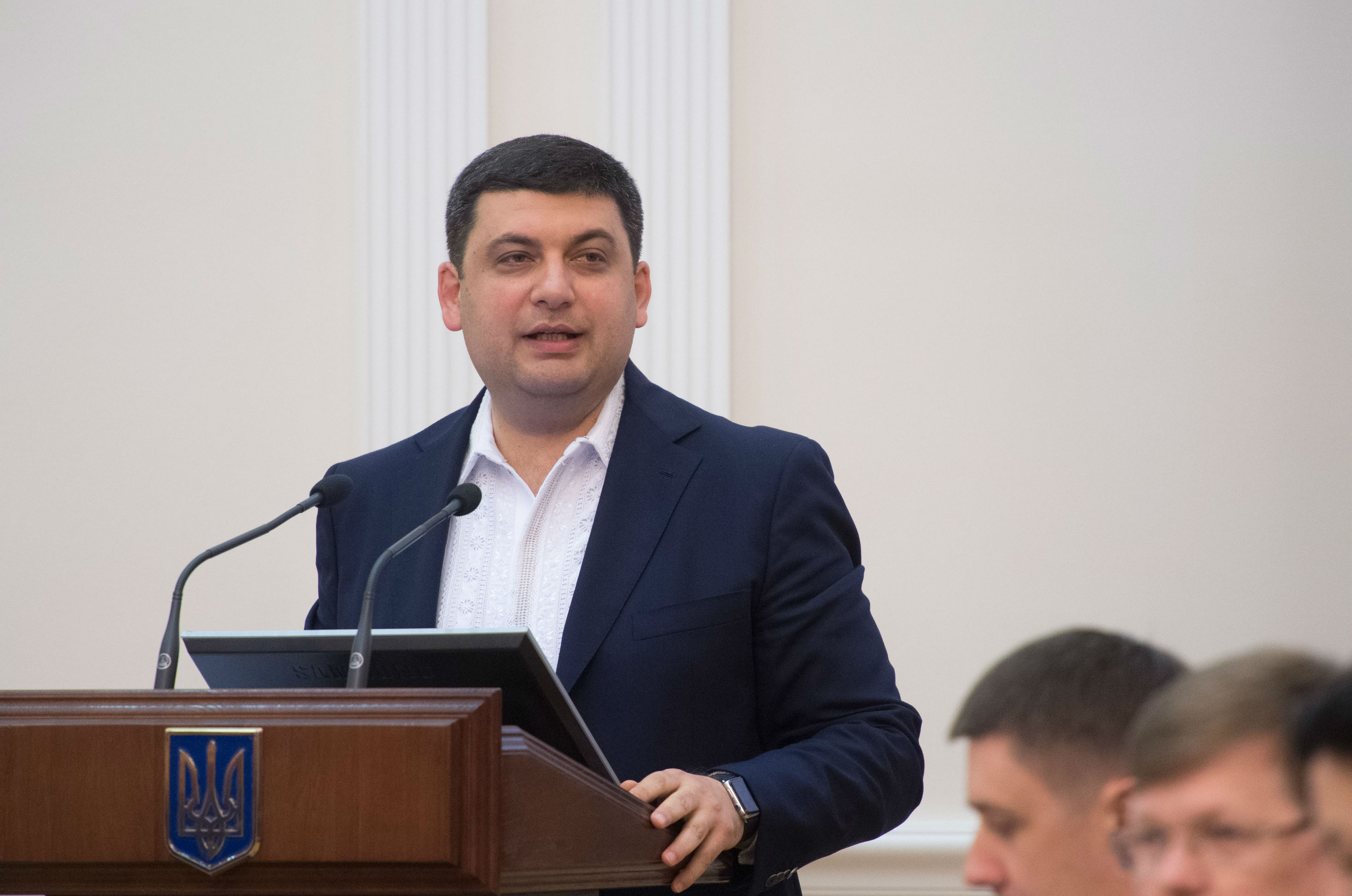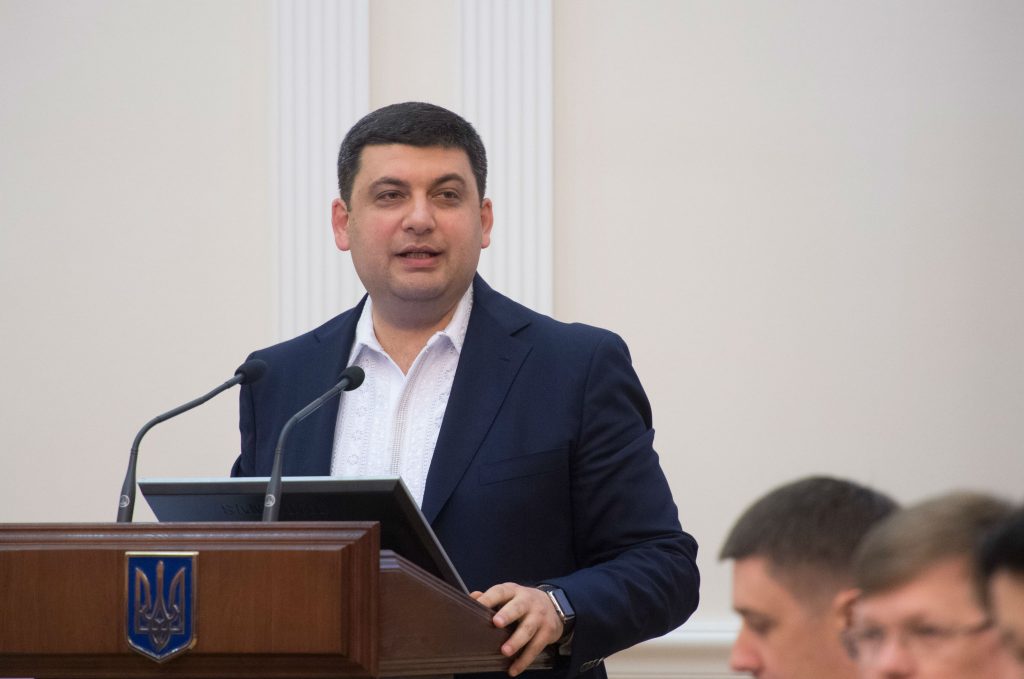 During almost eight weeks in office, Ukrainian Prime Minister Volodymyr Groisman has inspired largely negative reactions from Western analysts. Noting Groisman’s close relationship with President Petro Poroshenko, observers fret the young prime minister will merely function as a yes-man. His appointment was variously described as “same old, same old,” “not the best choice,” and an indication that the new government “is likely to be less reformist and competent.”
During almost eight weeks in office, Ukrainian Prime Minister Volodymyr Groisman has inspired largely negative reactions from Western analysts. Noting Groisman’s close relationship with President Petro Poroshenko, observers fret the young prime minister will merely function as a yes-man. His appointment was variously described as “same old, same old,” “not the best choice,” and an indication that the new government “is likely to be less reformist and competent.”
While there are legitimate reasons to question the wisdom of Groisman’s appointment, one important group does not share that pessimism: civil society activists with the greatest stake in the success of Ukraine’s reforms.
“While there have been some questions about Groisman from the international community, based on his previous history the possibility for him to push reforms forward is very real, so overall we are cautiously optimistic,” said Olena Halushka, international relations manager at the Reanimation Package of Reforms, on June 6.
According to Inna Borzylo, chief executive officer of the nongovernmental organization Centre UA, less than a week after his appointment, Groisman initiated a meeting with twenty civil society experts to discuss his plans for reforms.
“He clearly understands both the political risks and opportunities of becoming prime minister, and that failure would be a major setback,” said Borzylo.
Groisman’s initial actions provide some support for civil society’s optimistic outlook. Even before he was officially nominated, he fought to appoint a number of allies to cabinet posts, providing an initial sign of independence. In terms of transparency, Borzylo notes Groisman already created a new working model for both ministries and the prime minister’s office mandating regular cooperation with experts and activists.
As prime minister, he moved quickly with two major economic reforms. On April 27, Groisman’s cabinet approved the unification of natural gas prices into a single market for both retail consumers and businesses. Assuming parliament approves the cabinet’s resolution, it provides relief for a national budget burdened by consumer gas subsidies, an incentive for consumers to use energy more efficiently, the potential for an improved balance of trade, and a reduction in Russian gas imports. And perhaps most important, a single gas market ends shadowy intermediaries’ corrupt schemes.
More recently, Groisman’s cabinet approved the privatization of Odesa Portside Plant after years of delay. This would be the third largest privatization in Ukraine’s history, and in a positive move, Groisman announced that the government aimed to maximize the number of bidders for the plant, reducing the possibility of backroom deals. This is the first major privatization since Poroshenko’s election, and if followed by other major sales, it could play a significant role in jump-starting Ukraine’s economy, while also eliminating the corrupt bonds between oligarchs and state-owned companies. However, the IMF and the European Bank for Reconstruction and Development told Groisman that the sale of the plant fell short of international standards and might deter international investors.
Some observers argue that pressure from the international community, not the Ukrainian government, is the impetus behind the reform drive now.
Groisman’s pragmatism is another factor in his favor. He understands that a closely split Rada will make it difficult for the government to pass significant new legislation. Groisman told activists he would focus instead on implementing existing laws through government regulations and more efficient governance.
This strategy plays to Groisman’s strengths as a doer. He was a successful mayor of Vinnytsia, where he concentrated on the nuts and bolts of governing: developing the city’s infrastructure, repairing roads and parks, setting up new public transportation, and attracting Swiss investment (approximately 170 million hryvnias) to modernize the city’s heating system. Borzylo also argues that as speaker of parliament, Groisman was an effective manager, while remaining open to advice from civil society.
Activists remain cautiously optimistic regarding Groisman, but the new prime minister will ultimately be judged on results—and they have a long list of reforms they want him to push forward.
On the economic front, RPR wants large-scale state enterprise sales accelerated beyond Odesa Portside Plant to include at least three additional major privatizations by the end of the year. To promote foreign investment, meanwhile, activists want the Groisman government to introduce a “regulatory guillotine” that focuses on such items as simplifying foreign exchange regulations, while also making it easier for foreign investors to obtain value-added tax refunds.
Experts also stress the need to implement Ukraine’s revolutionary new civil service law at the central government level. RPR hopes this will result in the formation of a new Committee on Senior Civil Servants, as well as the appointment of state secretaries to ministries and the Cabinet to better manage the flow of paperwork and ensure continuity. On the personnel front, meanwhile, experts hope Groisman implements the portion of the civil service law calling for salary increases for government employees, in order to reduce the temptation for graft.
Civil society also wants the prime minister to continue devolving more fiscal power to the local level. Last year saw increased fiscal decentralization, resulting in greater local budgetary revenues. To start with, RPR wants the cabinet to quickly adopt a resolution to use the one billion hryvnia already allocated by parliament to support local community infrastructure.
To eliminate the possibility of graft, regional projects funded by the central government need to be awarded on a competitive basis by introducing project scoring on individual performance indicators. Finally, to ensure continued decentralization progress, activists have asked Groisman to make a senior official in each ministry responsible for implementing the decentralization agenda.
On the anti-corruption front, Groisman can provide needed political support for the National Anti-Corruption Bureau (NAB) and National Agency for the Prevention of Corruption (NAPC). Transparency International Ukraine recently called for NAPC to launch the new Electronic Asset Declaration System; according to Transparency International Ukraine, the Groisman government can assist by providing NAPC with the necessary IT infrastructure and funds to function.
Groisman’s recently released 2016 action plan reflects many activists’ priorities, and in many places goes well beyond their wish lists. The document emphasizes that Ukrainians must own the reform process, and it focuses heavily on the competent execution of existing legislation. This includes detailed matrices for each reform listing precise steps to be taken by ministries by specific deadlines over the course of the year. By providing such comprehensive information, the new government shows it has no fear of being held accountable for its performance.
It’s too soon to judge Groisman’s ability to drive reforms, and much could still go wrong. Certainly the split parliament will hinder things, and in certain areas—particularly Groisman’s anti-corruption agenda—progress remains unlikely without strong support from others. However, given the new prime minister’s promising start and civil society’s initial positive assessment, the West should avoid any rush to judgment and give Groisman a chance to prove himself.
Josh Cohen is a former USAID project officer involved in managing economic reform projects in the former Soviet Union. He is a regular columnist at Reuters and also contributes to a number of foreign policy media outlets.
Image: On May 19, Prime Minister Volodymyr Groisman presented his 2016 action plan. Credit: Cabinet of Ministers of Ukraine
